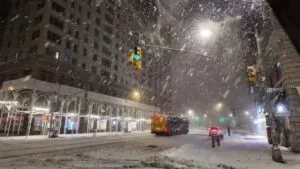Many of us have been there. You close the door, hear the click, and instantly realize your keys are on the wrong side. Panic sets in, and the question flashes in your mind: Can the police help me get back in?
It’s a reasonable question, especially when you’re standing outside, maybe in the rain or snow, staring at your locked door. I’ve been through it myself, and while it seems like calling the police is the fastest solution, it’s not always that simple.
In fact, there are specific situations where they can help, but most often, you’ll need to explore other options. Police can indeed help you when there’s an emergency, but there are nuances to it.
Let’s take a look at what happens when you’re locked out, how police may (or may not) be able to help, and the best alternatives for getting back inside your home.
Table of Contents
ToggleWhen Police Can Help in a Lockout

If you’re dealing with an emergency, police might be your go-to option. But what qualifies as an emergency?
- Life-threatening situations: Think of scenarios like a child being locked inside, an elderly family member with limited mobility trapped indoors, or even a pet locked in a car on a scorching day. In these cases, the police prioritize the call because safety is at risk.
- Potential hazards: Left the oven on? Maybe you’ve got a fire hazard situation brewing, or worse, a gas leak that you can’t afford to ignore. If there’s an immediate risk to property or people, police will likely show up. They know time is of the essence in these moments, and they will act fast to prevent harm.
When it’s an emergency, police officers may force entry to your house, but even then, it comes with conditions. They’ll need to assess the situation and make sure it genuinely requires them to step in.
But What About Non-Emergencies?

Now, let’s talk about what happens in more common scenarios: You’ve simply left your keys inside. It’s annoying but far from an emergency. In these cases, you might not get the response you’re hoping for if you call the police. Here’s why:
Resource Allocation
Police departments, especially in busy areas, prioritize calls related to immediate danger or criminal activity.
A lockout, unless it threatens life or safety, is typically not going to fall high on their list. Plus, they often don’t have the tools or training to unlock doors without causing damage.
Local Policies
Some departments outright discourage their officers from handling non-emergency lockouts. Others may allow it, but only under specific conditions.
If you do get lucky and an officer arrives, expect them to ask for proof that you live there, or the car is yours. You might need to show ID or have a neighbor confirm that it’s your home. And even if they help, they may still recommend you call a locksmith.
Why Police Might Refuse to Help

Before you pick up the phone to call 911, keep in mind that police may refuse assistance entirely for non-urgent lockouts.
- Busy officers: If they’re dealing with more serious incidents, like accidents or crimes, they simply won’t have the bandwidth to help you. And you know what? That’s fair. After all, officers have a lot on their plates, and they can’t always spare the time for a non-dangerous lockout.
- Department rules: In some regions, there have been complaints from local locksmiths, frustrated by the police stepping in to help with lockouts. This has led some departments to change their policies, with many officers now advising people to call professionals instead of handling it themselves.
What Happens if Police Break into Your House?
Let’s say it’s an emergency, and the police break into your home to save a pet or a child. That raises another concern: Who’s responsible for the damages? The answer varies by location. In some areas, the police department may be held accountable for any damage they cause during an emergency intervention.
But, in other cases, the homeowner may need to foot the bill. Before you call, it might be worth checking what the local rules are, just in case you want to avoid that surprise. And while we’re talking about surprises, there’s another thing to consider: privacy concerns.
When the police enter your home, even with good intentions, they have the legal right to act on anything they see in plain sight. If they notice anything illegal, they must investigate. It’s something to keep in mind before inviting them inside in non-emergency situations.
Alternatives to Calling the Police

Now that we’ve covered when (and if) the police can help, let’s talk about some other solutions you can try if you’re locked out.
1. Call a Locksmith
This is the most common and efficient way to handle a lockout. Locksmiths are trained for this exact situation, and they usually respond quickly.
Unlike the police, locksmiths have specialized tools that allow them to unlock your door without causing damage. You’ll need to pay for their services, but it’s often more cost-effective than repairing a broken door or lock.
Plus, locksmiths are available 24/7. So, if you’re stuck outside in the middle of the night, you can count on them to bail you out.
2. Check for Unlocked Windows or Spare Keys
If you’re in a hurry and don’t want to wait for a locksmith, it’s worth checking if any windows or back doors are unlocked. While I don’t recommend leaving windows open for security reasons, sometimes you get lucky.
Another quick fix is having a spare key stashed with a trusted neighbor or family member. It’s saved me a lot of hassle more than once!
3. Use a Credit Card or Plastic Tool
This one’s a bit of a gamble, but if you’ve got a simple latch-style lock, you may be able to slip it with a credit card.
Be careful, though—this method doesn’t work on most modern locks, and you risk damaging your card or door in the process. I’d only suggest trying this as a last resort, especially if you’re handy and know the technique.
Prevent Future Lockouts
No one likes getting locked out, so why not take steps to avoid it altogether? Here are a few tips that can help prevent future lockouts:
- Spare key strategy: Give a spare key to someone you trust—a neighbor, a close friend, or a relative who lives nearby. You could also invest in a secure hide-a-key box outside your home. Just make sure it’s hidden well enough that it won’t be obvious to potential burglars.
- Smart locks and keyless entry: If you’re prone to forgetting your keys, upgrading to a keyless entry system might be a lifesaver. Smart locks use codes or even biometric data (like your fingerprint) to unlock the door, so you never have to worry about a physical key again. It’s convenient, especially if you’re the type who often leaves keys behind.
Final Thoughts
Getting locked out of your house is frustrating, no doubt about it. But calling the police isn’t always the best course of action, especially in non-emergency situations.
Sure, they can help in true emergencies—like when someone’s safety is at risk—but for most lockouts, it’s better to call a locksmith or find another way back in. The next time you’re standing outside, keyless and stressed, consider your options carefully.
There are solutions that can save you time, frustration, and even a little money, too. With a spare key plan or a smart lock system in place, you might even avoid the hassle altogether.
Have you ever been locked out? What did you do to get back in? Also, find out how to lock your doors without a lock.
Related Posts:
- Commercial Responsibility for Slip and Fall Claims…
- Safest Countries in the World in 2025 - GPI…
- 25 Most Dangerous Cities in US - Updated Statistics for 2026
- Capital Cities in Europe: Top Destinations For You…
- How to Break Open a Safe - 7 Effective Methods
- 55+ Must-Have Best Toyota RAV4 Mods & Accessories








